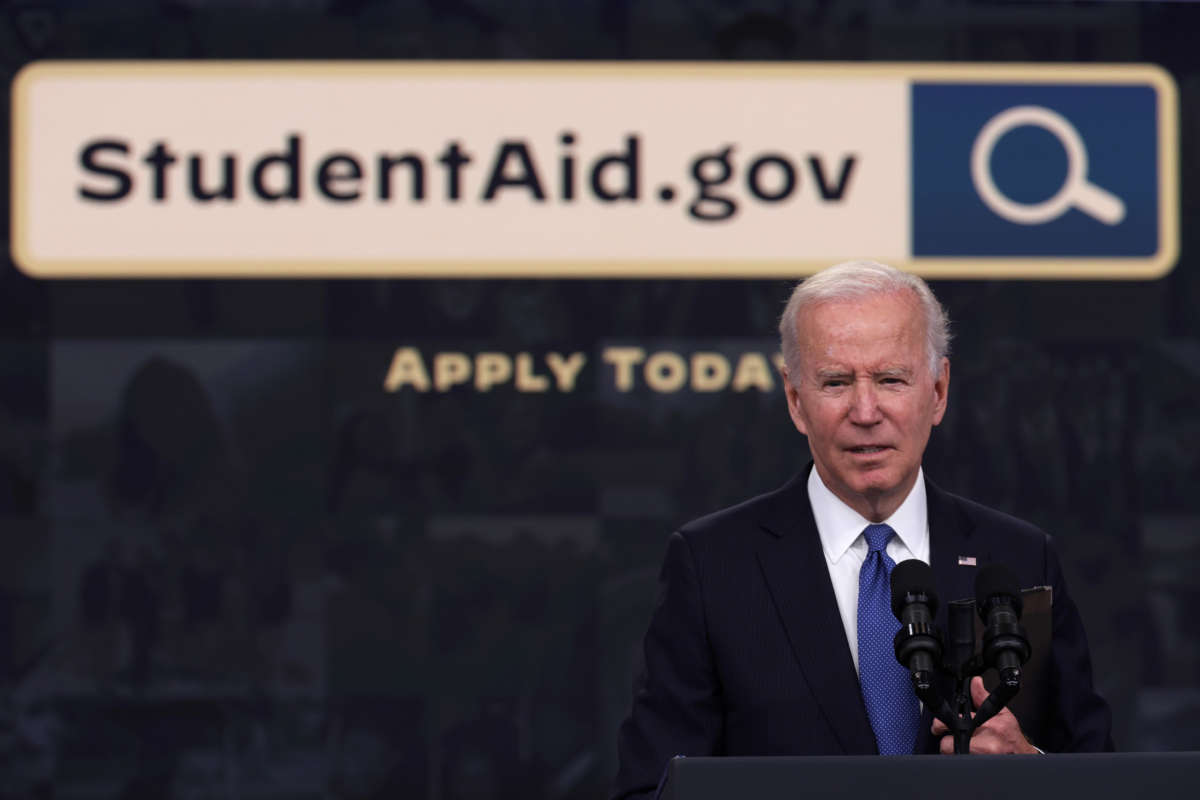Honest, paywall-free news is rare. Please support our boldly independent journalism with a donation of any size.
The White House is reportedly considering once again extending the student loan payment pause that is currently set to expire at the end of the year, as President Joe Biden’s plan to cancel up to $20,000 of student debt for borrowers is facing a court challenge from Republicans.
According to The Washington Post, two people with knowledge of the matter say that White House officials are in early talks about a potential pause extension, though no decisions have been made and it’s unclear if Biden has been involved in the talks.
“As the legal vulnerability has become clearer and clearer, the White House has been making increasingly firm plans to extend the loan repayment pause,” one source said. “The extension we’re likely to see is meant to make sure borrowers don’t have the rug pulled out from under them, rather than an indefinite replacement for loan forgiveness.”
When Biden announced the student loan forgiveness plan — to cancel $20,000 of debt for Pell Grant recipients or $10,000 for debtors who make less than $125,000 a year — in August, he said that his administration was extending the payment pause “one final time” through December 31.
But as a result of a lawsuit filed by six Republican-led states, the plan was blocked last week by Texas federal judge Mark Pittman, and was temporarily barred by an injunction issued by several Republican-nominated judges in the 8th Circuit Court of Appeals this week.
It’s likely that the plan will end up before the Supreme Court. From there, the fate of the plan is uncertain. Regardless of whether or not the plan will be struck down by the conservative-dominated Supreme Court, however, it could take months for a decision to be made.
If the moratorium is not extended, borrowers could be stuck in limbo, unsure whether they should begin paying the loans again when they could be canceled anyway or risk being in default status if the plan is ultimately nixed by the Court.
Debt cancellation advocates say that extending the moratorium is a bare minimum step that Biden can take in response to the court decisions.
“For three years, borrowers have been a political punching bag facing uncertainty about the future of their student loans. The judge’s decision makes the future even more worrisome,” said Student Debt Crisis Center President Natalia Abrams in a statement. “President Biden must pause payments further into the future to provide financial stability and peace of mind to 40 million Americans.”
The Debt Collective says that Biden has several options to provide relief to borrowers. They have called on the president to extend the moratorium indefinitely and say that he can cancel student debt using a different legal route in order to circumvent the current legal challenge. The group also says that he can and should simply ignore Pittman’s ruling, as student debt cancellation is a policy choice that shouldn’t be subject to court decisions to begin with.
“The problem is not the legal authority [to cancel student debt]. The authority is on strong footing,” the Debt Collective wrote on Twitter on Monday. “The problem is the courts are rigged. Right-wing judges are taking sides in policy debates that no one elected them to resolve. Biden must ignore them.”
Indeed, legal experts have pointed out that there were vast and bizarre insufficiencies in Pittman’s arguments.
Pittman openly admitted that he didn’t know basic tenets of the cancellation program, contradicted his own arguments that the plaintiffs recruited for the lawsuit by the GOP suffered damage as a result of the plan, and compared Congress granting the executive branch the authority to cancel student debt to the 1933 law that gave power to Adolf Hitler and rise to the Nazi party.
Some legal experts have taken issue with the fact that Pittman took up the case at all — after all, every other challenge brought by conservatives to challenge the plan has been dismissed by courts, having been determined by judges as an issue that shouldn’t be brought to the judiciary branch in the first place.
“[O]bjections to the Biden program present the classic kind of ‘generalized grievance’ that the Supreme Court has long held federal courts lack the constitutional authority to resolve,” wrote CNN legal analyst Steve Vladeck. If judges adjudicate based on their biases rather than established judicial roles, Vladeck wrote, then “the courts aren’t acting as courts; they’re just taking sides in policy debates that no one elected them to resolve.”
Media that fights fascism
Truthout is funded almost entirely by readers — that’s why we can speak truth to power and cut against the mainstream narrative. But independent journalists at Truthout face mounting political repression under Trump.
We rely on your support to survive McCarthyist censorship. Please make a tax-deductible one-time or monthly donation.
